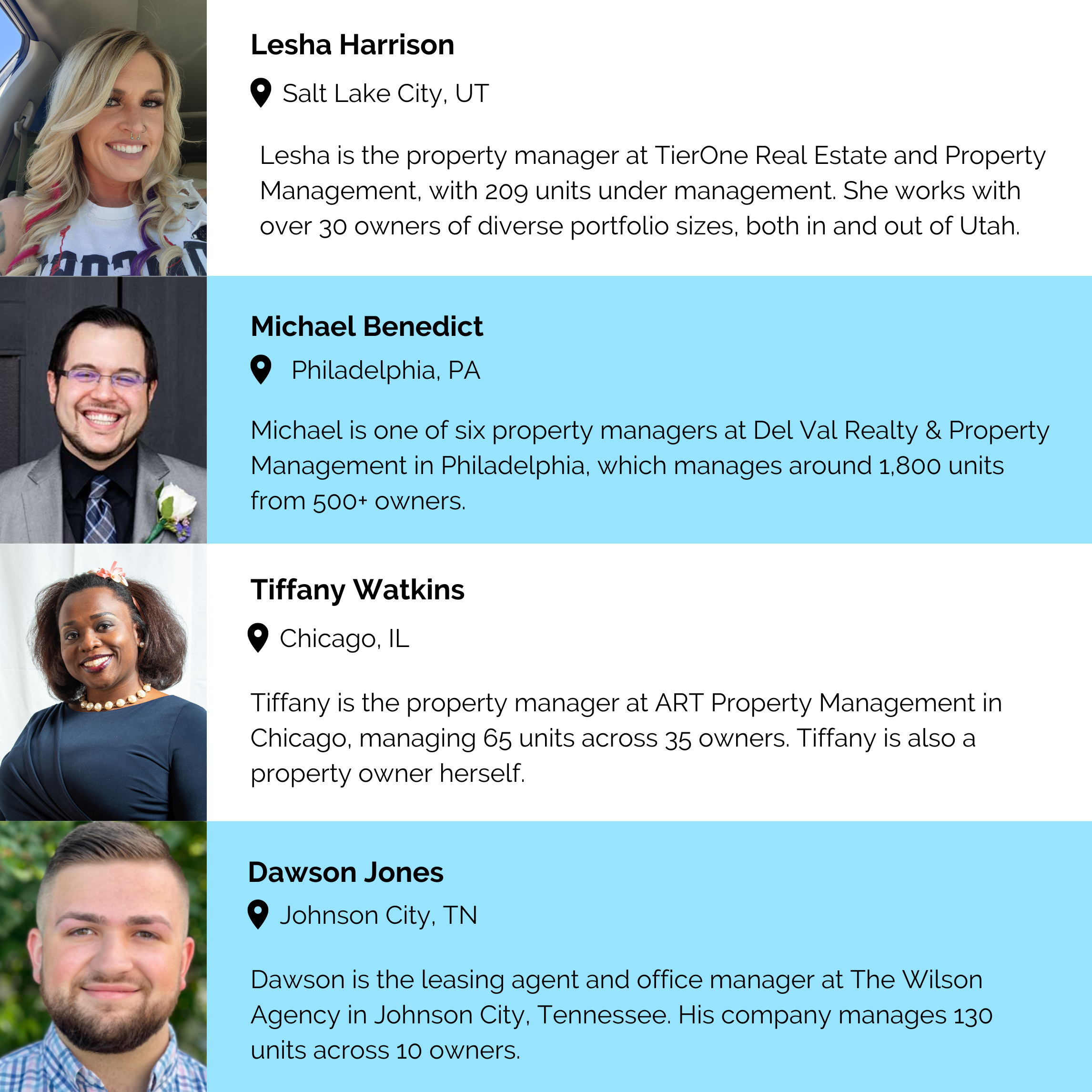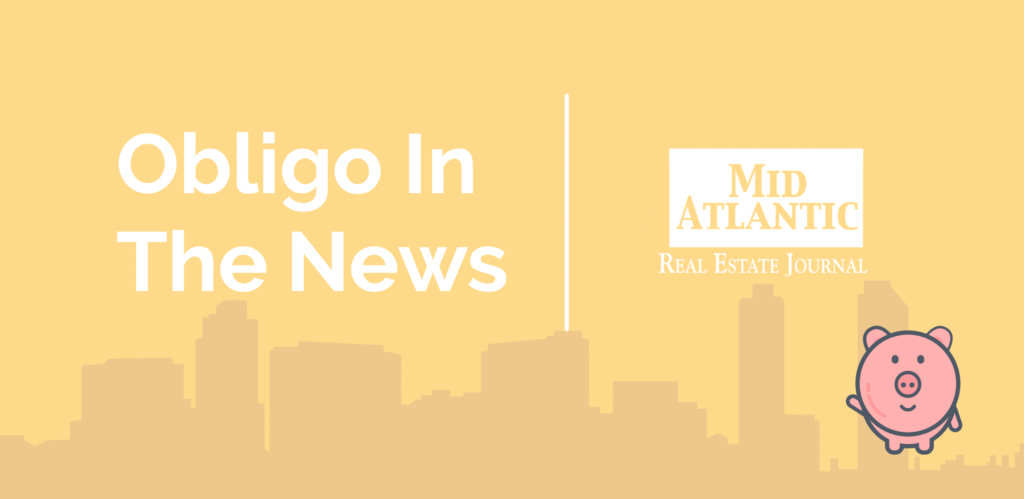In residential real estate, the relationship between property managers and their owners is an important one to nurture. Here at Obligo, we love insights gained from real-world experiences, so we spoke with four property managers to get their take on how to manage this key partnership.
Meet the Property Managers

What Owners Care About
Knowing what owners care about is the first step in tailoring a communication strategy for them. As investors, they care about the bottom line and the value of their properties. But it’s not all numbers — owners want to know that their assets are being taken care of by responsible tenants as well.
The kind of tenants that property managers put in the properties could make or break the investment. Sometimes, it means the difference between a simple $1500 carpet replacement and a $10,000 property rehabilitation if the tenant trashes the unit, Lesha said.
“I personally care that people maintain their property because it’s an asset, and I want the asset to continue to increase in value,” said Tiffany, who is also an owner herself. “I’m an advocate for making sure the properties are maintained and my clients want that as well, because presentation is everything.”
Cadence of Owner Communication
Every property management company has their own cadence of communicating with owners. According to the managers we spoke with, this typically consists of:
– Bi-monthly or monthly report with detailed financial breakdown
– Phone calls followed with emails to confirm maintenance-related actions
– Occasional video calls with out-of-state owners to show them the condition of their properties
When onboarding new owners, property management companies would set up cash reserves or a pre-agreed upon amount, such as $500, under which no owner approval is needed for action. With this in place, property managers only need to update owners on the major events. According to Lesha, the out-of-state owners she works with have other businesses or full-time jobs, so they don’t want to be bothered unless something potentially “life-altering” happens.
Barring some first-timers, most owners are savvy investors and don’t require hand-holding. If they do tend to micromanage or demand very granular communication, property managers would discourage that behavior. “They hire us to be professionals, so we ask them to put the trust in us, to let us do our jobs and bring the ball through the goal line,” Michael said.
A light communication cadence is also beneficial for owners — they pay good money to take away the day-to-day stress of managing a property, so they don’t have to be bombarded with information unless necessary, Dawson said. Of course, all the managers are one text away if something urgent happens.
Communicating Change
The rental industry is fast growing and new solutions are emerging everyday. If a property manager decides to take an innovative approach to leasing, or implement a new tech solution like Obligo, how do they inform the owners? Our panel of professionals gave two tips:
1. Give owners enough time to adjust
Owners need time to digest new changes. Whenever there’s a change scheduled, Del Val will send out email blasts, newsletters or videos way in advance to make sure every owner gets notified in time, Michael said.
For Tiffany, if the change requires her owners to increase rent or take some portion out of their income — anything that affects their bottom line — she gives 30 to 60 days notice. She will use that time to answer their questions and help them get used to the new system. If the change won’t affect how owners receive their money, she will give a 2-3 weeks notice.
2. Be assertive in your decision
While it’s necessary to explain the rationale behind new changes, property managers need to be confident and inspire owners’ trust in their decisions.
When TierOne Real Estate and Property Management implemented Obligo’s deposit-free solution, some owners unfamiliar with the concept were worried and called Lesha. “We basically tell owners that Obligo is how we’re going to handle our deposits moving forward. Paper checks were getting lost in the mail or stolen. It just wasn’t working for us. Now it’s all electronic with Obligo. And they’re pretty reassured after that.”
“In our eyes, Obligo is the same thing as a traditional deposit,” Dawson added. “If a tenant damages their property, our owners are still protected whether the tenant has paid upfront or not, because we either have the deposit, or a billing authorization to recoup those funds.”
Whether it’s a software vendor or a resident benefits package, at the end of the day people have a natural resistance to change. But savvy property managers know when and how to push owners toward better solutions.
“People don’t like change — they either don’t understand it or just choose not to process it,” Tiffany said. “But that’s not an option, because I’m bringing in things that will help them become more efficient and effective in managing their properties at a distance.”
Challenges in Communication
Despite years of experience, property managers still encounter challenges when communicating with owners. One of the major struggles is discussing unexpected costs.
When unexpected costs come up, surprised owners might need an extra-detailed explanation before opening their checkbook. Lesha put it in simple terms: “Nobody wants to drop six grand on an A/C unit that they were hoping would work for the next 10 years.”
“As an advocate for our tenants, I want to make sure they’re getting what they pay for,” Dawson said. “But on the owner’s side, they’re not involved in their properties a lot, and sometimes they just have resistance when you ask for extra money.”
Dealing with this challenge requires a lot of patience. But if the situation gets worse, tenants will complain, which helps property managers convince the owners, Dawson said. If a tenant is unhappy, there’s a risk they might not renew the lease, hurting the owner’s income.
Communicating state rules and regulations is another big challenge, especially during COVID, when many rental assistance programs and eviction moratoriums were in place, Michael said.
Other challenges include non-communicative owners who won’t give direction for major maintenance, or older generations of owners who aren’t necessarily digital natives.
Tips from Property Managers
Communication is an art and a science. Every property manager we spoke with follow best practices based on their years of experience, and they generously shared some with us:




If you’re a property manager looking for simplified rental solutions, Obligo’s holistic suite of deposit management products could be your answer. Get in touch today to learn how you can streamline operations and power a better resident experience!







Leave a Reply